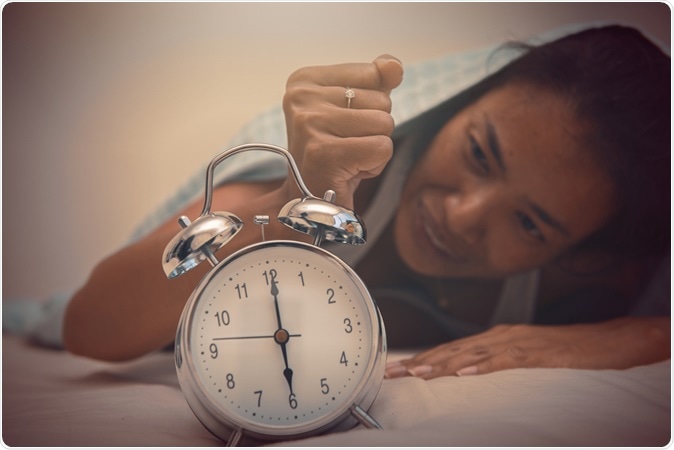According to a new study, people who routinely had a disrupted night’s sleep had an altered 24 hour cycle were more at risk of getting mood disorders, depression, bipolar disease. They score low on happiness and feel more lonely say researchers. This study, explain researchers, is vital in understanding the balance between rest and activity. The study appeared in the latest issue of the journal Lancet Psychiatry.

Image Credit: Supawadee56 / Shutterstock
The authors of the study from Scotland, Ireland and Sweden have shown that disruptions in the circadian rhythms of people can lead to problems in mental health. Daniel Smith, professor of psychiatry at the University of Glasgow and lead author of the research explained that by 2050 almost two thirds of the population would be living in the cities where there is an evident disruption of the circadian rhythm. He called this a public health issue. “…How do we take account of our natural patterns of rest and activity and how do we design cities or jobs to protect people’s mental health?” he said.
For this study the team of researchers looked at a large amount of data from the UK BioBank. They obtained health data and information on over 500,000 participants since 2006. The participants were aged between 37 and 73 years. For this study alone they filtered out information on 91,105 participants who were asked to wear wrist-based activity trackers for a week any time between 2013 and 2015. According to Smith, they measured 100 movement data points in three dimensions per second over the week. They recorded the activity of the individuals during the 10 active hours a day and compared it to the least active 5 hours a day. The result of this comparison was called the relative amplitude.
Smith explained that this relative amplitude showed that regularity and changes in the routine of rest and activity. He said that those who are active during the day and sleep well at night are the ones with healthy profiles and they have higher scores in relative amplitude. Those with a disturbed sleep on the other hand, he explained, and are up at night have lower activity during the day and have a lower relative amplitude.
Thereafter the team gave the participants questionnaires to complete. This looked at scores on loneliness, unhappiness, reaction time, depression, bipolar disease, anxiety and neuroticism etc. The final results were calculated on the basis of the relative amplitudes of the population. The participants were classified into five groups based on their relative amplitudes.
The groups were found to be of nearly equal size. The team negated influences of other factors such as age, gender, season during which the test was taken, smoking status, socioeconomic status, past traumatic experiences from childhood etc. these could also have an influence on the mental health and thus had to be accounted for before any conclusions could be drawn, explain the researchers.
Results revealed that people with low relative amplitudes had poorer mental health. Movement from one low relative amplitude group to a lower relative amplitude meant a 9 percent increase in loneliness they found. There was an increase of 6 percent and 11 percent in risk of depression and bipolar disorder respectively with lowering of relative amplitudes. As the amplitudes decreased reaction times also reduced and so did the measures of happiness and satisfaction with one’s health.
According to Smith, these figures may appear small but are all significant. He added that the main sufferers were people with poor sleep hygiene. This meant those people who were up at their mobile phones at night or woke up for a snack or tea or a drink middle of the night. He added that day time activity also mattered a great deal. He called “morning fresh air” as important as a “good night’s sleep” for optimum mental health.